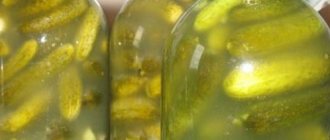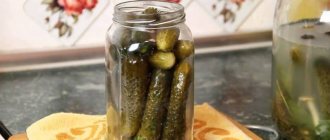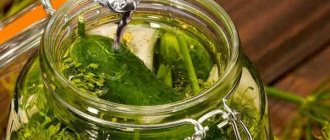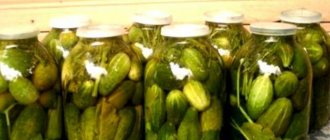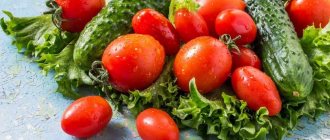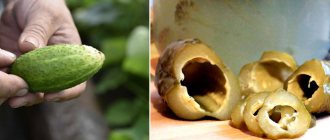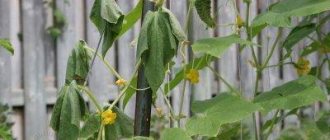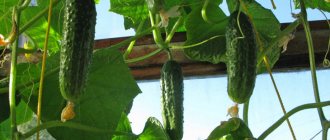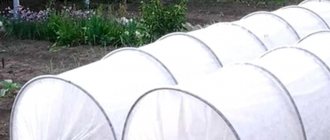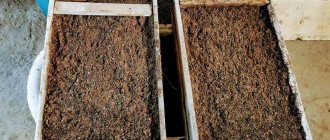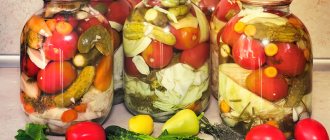Why do pickles become soft?
It happens that you open a jar, take out a cucumber, and it literally falls apart in your hands. The question immediately arises: why do vegetables become soft when pickling? It is impossible to answer this question unequivocally: there can be many reasons.
Mistakes during sterilization
Cucumbers are rolled using cold and hot methods. They are salted, fermented, pickled. When canning in glass jars, it is important to follow some rules.
The first rule is thoroughly washed vegetables and properly processed containers.
The second is the thermal processing mode.
The slightest violation of sterilization technology can lead to the following problems:
- bloating of lids;
- cloudiness of the brine;
- violation of the fruit structure;
- change in the taste of pickling.
Mistakes that inexperienced housewives make when preserving:
- Dirty containers or vegetables, unsterile lids.
- Temperature violation.
- Dishes not suitable for sterilization.
- Wrapping cans after pasteurization.
Violation of tightness
The next reason why pickles become soft in a jar is a violation of the seal. Air gets into the hole formed, and the preservation deteriorates.
This happens due to a number of factors:
- low-quality lids for preservation;
- faulty rolling key;
- loose seaming;
- mechanical damage during storage.
Attention ! After screwing, turn the jar upside down to check the seal. If air and liquid do not come out, then the seal is strong.
Effects of pectolytic enzymes
Sometimes we notice viscous mold on top of the brine. It occurs due to the ingress of mold fungi into the preserved food. Under the influence of enzymes, protopectin (an insoluble substance in plant cell walls) is converted into pectin (a water-soluble substance) and pectic acid. As a result, the fruit becomes empty and soft inside.
If you notice a problem, do not rush to throw away the preserved food.
Carry out the following activities:
- Remove mold.
- Drain the brine.
- Add salt to taste.
- Boil for 3 minutes.
- Pour the brine into the jars and seal with new sterile lids.
To improve the taste of the product, add spices containing tannins that fight fungi. These include oak bark and leaves, garlic, horseradish root.
Advice ! To prevent mold, dry mustard powder is sprinkled over the brine. You can also use horseradish, previously grated. It will add firmness to the cucumbers.
Incorrect preparation of brine
Preparing brine is one of the main points in preservation. Violation of technology leads to a change in taste and souring of the fruit.
Cooking errors:
- Not enough salt. To avoid this, add 1–1.5 tbsp. spoons per liter jar.
- Lack of vinegar. Add 70 g of vinegar to a three-liter jar.
- Using citric acid instead of vinegar.
- The use of iodized salt or “Extra”.
- Fermentation during pickling, that is, long-term fermentation. The usual fermentation time is 3 days.
When salting, hot and cold methods of pouring brine are used.
There are several nuances when preserving with cold water:
- Water for brine is taken clean, purified or well.
- Use coarse salt. “Extra” and iodized negatively affect the taste and hardness of the fruit.
- Add a moderate amount of salt: 1–1.5 tbsp. spoons per liter of water.
- The hardness of the water should be medium. Soft liquid softens cucumbers, while hard liquid gives them an iron taste.
- Spices are chosen correctly. Blackcurrant, horseradish, oak leaves, cloves of garlic and dill inflorescences are suitable. Exotic lovers add celery, basil, mint or marjoram.
Important ! A large amount of garlic reduces the crunchiness of the fruit.
If desired, you can prepare lightly salted cucumbers. The principle of salting is the same as with conventional preservation, only the salting process takes place in 1-2 days. Such fruits are not stored for longer than a week; they are eaten immediately. It happens that some of them become limp. The main reason for this is lack of salt.
Mistakes when laying cucumbers
When pickling, pay attention to the placement of fruits:
- Insufficient density of arrangement disrupts the ratio of brine to fruits and leads to softness of the latter.
- In large containers, due to increased pressure, the lower layers become soft. Therefore, it is better to use jars up to 3 liters.
- The brine should cover the vegetables 3-4 cm above the surface.
- Fruits for preservation are chosen of the same size.
Poor quality cucumbers
You can get good preserves only from healthy and strong fruits. Unfortunately, sometimes vegetables appear in the garden beds and quickly become soft.
There are several reasons for this:
- Improper nutrition of vegetables: excess nitrogen fertilizers.
- Insufficient watering: Dry soil negatively affects plants.
- Unfavorable weather conditions: heat, cold, lack of light.
Low-quality fruits cannot be used for pickling.
When choosing vegetables, consider the following factors:
- The fruits should be small in size. Gherkins are great.
- The skin should be without yellow spots, with pimples.
- Undamaged fruits with small seeds are suitable.
- Large or yellow cucumbers are not suitable for canning.
Attention ! The collected vegetables are used within 24 hours.
Another reason why pickles are soft is the wrong variety. For preservation, varieties with thin skin and a high sugar content are chosen (for example, varieties Nezhinsky, Rodnichok).
Improper storage
Often, improper preservation conditions lead to softening of cucumbers. At high temperatures, lactic acid, which acts as a preservative, is destroyed in pickles. The fruits lose their taste and become limp.
Important ! The optimal storage temperature is up to +3 °C. The best place is the cellar.
Failure to comply with shelf life also negatively affects the taste. Any preparation should be consumed within 1-3 years.
Long-term storage
Sometimes cucumber fruits dissolve, and their inner pulp turns into jelly. This problem occurs due to the pickling salt being stored in the cellar for too long. Salted vegetables can be stored for no longer than 2-4 years, after which it is better to throw them away as they begin to spoil.
To prevent pickled cucumbers from turning into mush, you should not delay the process of preparing them. The process of pickling vegetables lasts for 2-4 days. However, some people decide to ferment them for 10-12 days. You shouldn’t do this, as such a long cooking time will cause the fruits to spoil.
The main reason why voids form inside a cucumber is the rupture of the tissues of the seed chamber under the pressure of gases. These cavities may be present in the vegetable while it is still fresh or appear during the fermentation process.
Simply put, there are two options:
- the fruit was salted when it was already hollow;
- it became like this after salting.
Among the factors leading to ruptures:
- violation of agricultural practices during cultivation: improper watering, excessive or insufficient fertilizing;
- errors in storing crops and canned products;
- slow cooking with the release of large amounts of gases;
- overripeness of fruits.
We suggest you read why rabbits die for no apparent reason, they die one after another, what to do, how to treat young animals
How to pickle cucumbers correctly
Each housewife has her own recipes. To get strong and crispy canned fruits, follow these basic rules:
- They start by preparing the container. The jars are washed with a solution of baking soda and steamed or fried in the oven.
- For pickling, take freshly picked strong fruits of the same size.
- Only pickling varieties are used.
- Before the procedure, the fruits are thoroughly washed and soaked in cold water for 4–6 hours.
- To prevent vegetables from losing color during preservation, they are doused with boiling water before placing them in cold water.
There are two ways to prepare for the winter: salting and pickling. Let's look at how to pickle cucumbers without sterilization.
This is interesting:
How to prepare delicious pickled cucumbers with grape vinegar.
How to cook pickled cucumbers in a bag quickly and tasty.
Pouring hot solution
The algorithm is simple:
- Spices are placed in a clean bowl: horseradish leaf, 3 currant leaves, 3 cloves of garlic, dill inflorescence, 2 oak leaves, 2 cherry leaves.
- The cucumbers are washed and placed tightly in jars.
- Dilute salt in cold water and pour in vegetables so that the water is 3-4 cm higher. Take 1 tbsp per liter jar. a heaped spoonful of salt.
- Leave to ferment for 3 days.
- Then the brine is drained and boiled for 2-3 minutes, constantly removing the foam.
- Cucumbers and spices are washed in running water and again placed tightly in jars.
- Fill with hot brine and immediately roll up with iron lids.
Such preparations are well stored on shelves at home.
Important ! If the summer is hot, then the cucumbers are sterilized before planting. Three-liter jars are kept for 5 minutes, liter jars - 2-3 minutes.
Cold billet
To do this you need:
- Prepare the container, wash the vegetables. Do not sterilize jars.
- The set of spices can be used from the first recipe; if desired, add basil, bay leaf, and parsley.
- Place spices, cucumbers, pour salt (50 g per liter jar). Fill with cold water, close with plastic lids and immediately take to a cool place.
Such preparations are stored only in the cellar or refrigerator.
Pickling
Such vegetables are prepared with vinegar and must be sterilized. Proportions of brine per three-liter jar: 70 g of 9% vinegar, 2 tbsp. spoons of sugar, 1 tbsp. spoon of salt.
Cooking method:
- Place the spices, pre-cut into large pieces, into clean jars. Add cucumbers on top in a thick layer. Cover with lids and let stand for 2 hours so that the vegetables absorb the aroma of the herbs.
- Prepare the brine. Measure out the required amount of water and bring it to a boil. Dissolve sugar and salt.
- Pour the brine into jars. Pasteurize liter jars for 5 minutes, three-liter jars for 10.
- Add vinegar to each jar and immediately seal.
- Turn the pieces upside down and let cool.
Common Questions
- variety (special pickling varieties of cucumbers are recommended);
- fruit size (from 5 to 13 cm);
- degree of maturity (incomplete);
- peel (lumpy, thick, preferably prickly);
- freshness (the freshest);
- color (juicy, green);
- taste (not bitter).
There are many reasons for getting soft and hollow pickles. Among them are improper selection and preparation of fruits, containers, saline solution, poor water quality, violation of the tightness of jars, temperature and timing of pickling, as well as storage. They can influence separately or in combination, so it is important to exclude each negative factor.
Pickled cucumbers with fried potatoes are a favorite dish of many adults and children. Pickling at home is a simple process if you know a few secrets. A common problem during canning is fruit softening.
In this article we will tell you why pickles become soft in a jar and how to avoid this. We will teach you which spices are best to add and how much salt to take to get strong and crispy fruits.
Adviсe
Small secrets will improve the quality and taste of preservation:
- Add 3-5 mustard seeds or 1 tbsp to the brine. spoon of vodka. This will protect the workpiece from tearing off the lids.
- If you put a piece of horseradish root on top of the jar, you can avoid mold.
- A small piece of oak bark will make the fruit crispier.
- To make cucumbers pickle faster, cut off their tails.
- To increase crispness, an aspirin tablet is added to the preservation.
- A teaspoon of mustard will make the vegetables crispy.
Advice ! Do not put fruits of different sizes in one jar. Large cucumbers take a long time to pickle, small ones - quickly.
Recommendations from experienced housewives
Advice from experienced chefs will help you understand why salted fruits turn out soft and avoid the problem:
Nina : “Pickles become soft due to moldy mushrooms getting into the preservation. I had this problem until I started using mustard powder. I add it before twisting, 1 teaspoon per three-liter jar.”
Peter : “The reason for the softness of pickled cucumbers is the wrong variety. I choose those that are intended for pickling. I also add an aspirin tablet to the brine.”
Marya : “I’ve been closing cucumbers for a long time. I understood one thing: vegetables must cool quickly after pasteurization. I don't wrap them up. I use only young fruits for pickling.”
Mistakes when growing cucumbers
Cucumbers are sensitive to the slightest changes in agricultural practices, which is noticeable in the quality of the harvested fruits - they can be bitter or empty inside.
Violation of the watering regime
Along with warmth, sufficient moisture in the soil and air is important for vegetables. If there is a lack of it, cucumbers become hollow. If in the heat water does not reach all organs of the plant, then cucurbitacin is intensively produced in the fruits. It imparts a special bitterness to the peel.
Incorrect application of fertilizers
Cucumbers love nutritious soil. It is important to apply fertilizers in a timely manner:
- organic and nitrogen - before planting and in small volumes at the initial stages of plant development;
- by the beginning of the fruiting period - potassium and phosphorus with micro- and macroelements (iron, manganese, boron, copper, molybdenum, zinc, magnesium and calcium).
The quality of the product is affected by both their deficiency and excess. For example, cucumbers become loose and hollow due to the high nitrogen content in the form of ammonium salts. This usually occurs due to the introduction of fresh manure, overfeeding with urea, etc.
Problematic soil
Cucurbitacin is especially actively produced in cucumbers grown on clay soils. It is necessary to provide the vegetable with light and loose soil, with high air and moisture permeability, as well as neutral acidity within the pH range of 6.4-7.
Temperature changes
Representatives of the Pumpkin family experience stress due to sudden temperature fluctuations. It is necessary to avoid sudden changes that exceed 3-5°C. This is especially important at the stage of fruit laying.
